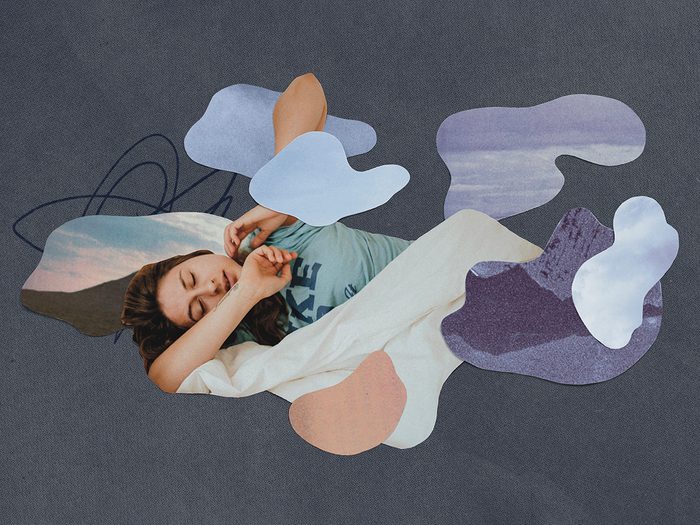I Get Enough Sleep—So Why Am I So Tired?

Many of us clock six or seven hours of sleep each night, yet still feel sluggish or exhausted the next day. If you’re feeling zapped, zonked and zoned-out—or just sick and tired of feeling, well, sick and tired—it’s time to figure out what’s causing your fatigue.
For as long as I can remember, I’ve felt like I needed to catch up on sleep. That groggy, just-woke-up feeling many of us have in the early morning sometimes drags on for hours or even persists all day, even after a good night’s sleep, no matter how many coffees I down. Now in my late thirties, I feel like the word “tired” is a key part of my identity.
There’s a wide range of reasons people lack energy during the day, but we’re here to help you figure out why you’re so sleepy—and hopefully how to fix it.
(Related: How Circadian Rhythm Disorders Can Affect Your Sleep)
What is “bad sleep,” anyway?
If you wake up feeling refreshed and able to carry out your daily activities without being too tired, that may be a sign that your sleep health is pretty good. But if you wake up feeling like you’ve run a marathon or were up all night (and maybe you were!), that’s a red flag, says Mark Boulos, a neurologist and sleep health expert at Sunnybrook Hospital in Toronto.
“People come with different levels of energy, and every one of us is very different—we all need a different amount of sleep,” he says. “But if you’re so tired that you don’t have the ability to carry out tasks, that’s obviously a big problem.”
Many individuals monitor their sleep using an app on their smartphone, a smartwatch or a fitness tracker—not a bad idea, Boulos says, but not the same as comprehensive testing in a sleep lab. “These products will give you a general idea of how well you’re sleeping, but not the nitty gritty of what sleep stage you’re in,” he explains. “They can’t tell you if you have sleep apnea.” If a formal sleep study is needed, your family doctor can refer you to a local sleep clinic.
I swear I’m sleeping eight hours a night. So why am I still so tired?
There are many reasons people feel tired, Boulos says, and both medical and psychological factors may play a role. A doctor may review your prescriptions and order several different blood tests, including checking your ferritin (iron) and various vitamin levels. If you’re found to have an iron deficiency, your medical professional can recommend different types of iron supplements to help reach the level that’s right for you with minimal side effects (iron supplements can cause an upset stomach for some people). They may also screen you for potential thyroid issues, like hypothyroidism, which can cause exhaustion as a main symptom.
To help a patient identify and treat their sleep issues, Boulos looks for signs of an underlying sleep disorder as well as physical markers. “Are you snoring?” Boulos asks. “If you’re a loud, noisy sleeper or you’re witnessed not breathing in sleep, it could be sleep apnea.”
Having the urge to move your legs constantly while trying to drift off can be a sign of restless legs syndrome—a condition that occurs in approximately seven to 10 percent of the population, and has been linked to anxiety and depression. Individuals who are dealing with long COVID may also experience sleep issues, as the virus can affect the part of the brain that manages sleep. “It’s unfortunate—but also uncommon,” Boulos says.
(Related: 13 Medical Reasons You’re Tired All the Time)
Should I be sleeping more?
While logging extra hours in bed to make up for poor sleep may sound good in theory, it’s not always a healthy choice. “Getting more than nine hours of sleep [on a regular basis] is harmful for you, and less than six hours is also harmful,” Boulos says, reiterating that most health associations recommend seven to nine hours of sleep per night for adults. “The extremes are not good.” Boulos also advises maintaining the same sleep schedule throughout the week—11 p.m. to 7 a.m., for example—so try not to stay up super late on Saturday nights (or stay in bed until noon the next day).
If you’re an active dreamer, you may feel like you’re not getting the kind of deep sleep you need—almost like your brain hasn’t rested properly—but that isn’t actually the case, according to Boulos. “Dreaming is not necessarily related to sleep quality,” he says. Dreams happen during the REM stage of sleep, which is particularly restorative and good for your body. Other indicators, like how tired you are during the day, or how often you wake up in the night, are more reflective of sleep quality.
“If you’re having poor sleep, get it checked out by your family doctor,” Boulos advises. “You may need a referral to a sleep specialist.”
Next: Can a Weighted Blanket with Cooling Tech Help Me Sleep (and Not Over-Heat)?




